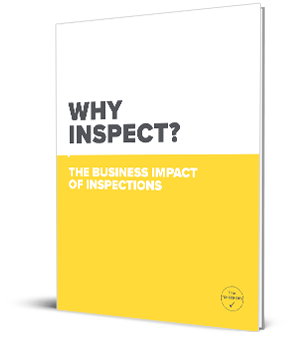When we’re demonstrating The Checker at trade shows, we like to ask safety, maintenance, and operations managers about their organization’s attitude toward commercial equipment inspections.
Many of the answers we get shed light on how the importance of inspecting commercial equipment is often undervalued by the people doing the inspections—as well as by those setting policy and establishing the company culture.
What we’ve found is that they’re basically three types of attitudes toward inspections.
1. Compliance, Compliance, Compliance
If the managers we speak to work for a business that uses commercial road vehicles, they generally know all about the importance of being compliant with laws about inspecting commercial vehicles. Similarly, they’re usually aware of occupational safety and health compliance standards (i.e. OSHA in the U.S. and CCOHS in Canada) that apply to equipment they use. When they think “inspections” they think “compliance,” and they’ll confidently tell us, “We make sure we’re always compliant.”
But if you ask whether the inspections are being done in a way that actually improves business processes, or if they’re just being “pencil-whipped” (i.e., basically faked) to satisfy the law, many acknowledge that they’re not being done properly.
2. What’s the Point?
Many managers of equipment that’s not legally required to be inspected tell us they don’t do inspections at all for that equipment, or that they do them but not in a manner that makes sure the equipment actually gets a good inspection.

“Why not?” we ask, and we get responses like:
- “It’s too much of a hassle.”
- “Daily inspections take too long, and we just don’t have the time.”
- “We don’t do them, and we don’t worry about it because it hasn’t hurt us yet.”
- “We do daily circle checks, but we don’t have an inspection checklist to make sure everything gets checked.”
- “We created our own inspection checklist, but it doesn’t really work.”
- "We sometimes do inspections, but we have no system for tracking them or taking action on the results.”
- “We do weekly inspections, but daily is too much.”
- “The only equipment we inspect is our forklifts.”
3. Inspections Help Us Perform Better
We do find a good number of managers who understand that inspections can provide benefits beyond compliance. They tell us that by doing inspections the right way—with an effective inspection checklist—they save money on maintenance and equipment-operating costs, increase the longevity of their equipment, lower safety and health costs, and improve employee morale once personnel realize doing inspections properly makes their jobs easier and safer.
They do say it takes more time to do inspections as they should be done, but that it’s not a significant amount of time compared to the benefits. Many of them tell us that they consider their strong inspection processes a competitive advantage over companies who don’t bother with inspections.
Conclusion
Businesses that assume that if there’s no direct legal or regulatory requirement for inspection, then there’s no legal imperative to inspect equipment are overlooking their liability exposure. If a workplace accident occurs due to improperly functioning equipment, a record of regular inspections can make the difference in shielding a company from liability.
But organizations that are concerned only with protecting their back legally are missing the opportunity to also improve their business performance. With daily inspections using an equipment-specific, detailed, easy-to-use inspection checklist such as The Checker, businesses can achieve bottom-line benefits such as:
- Minimizing the risk of costly workplace injuries and downtime.
- Better identifying chances for cost-saving preventative maintenance.
- Encouraging accountability for the equipment among personnel, who almost invariably operate equipment with greater care if it’s inspected daily.
As we tell anyone involved with commercial equipment use, inspecting commercial equipment isn’t just about doing what you have to do—it’s about being smart.
Image courtesy of One Way Stock, Creative Commons.










